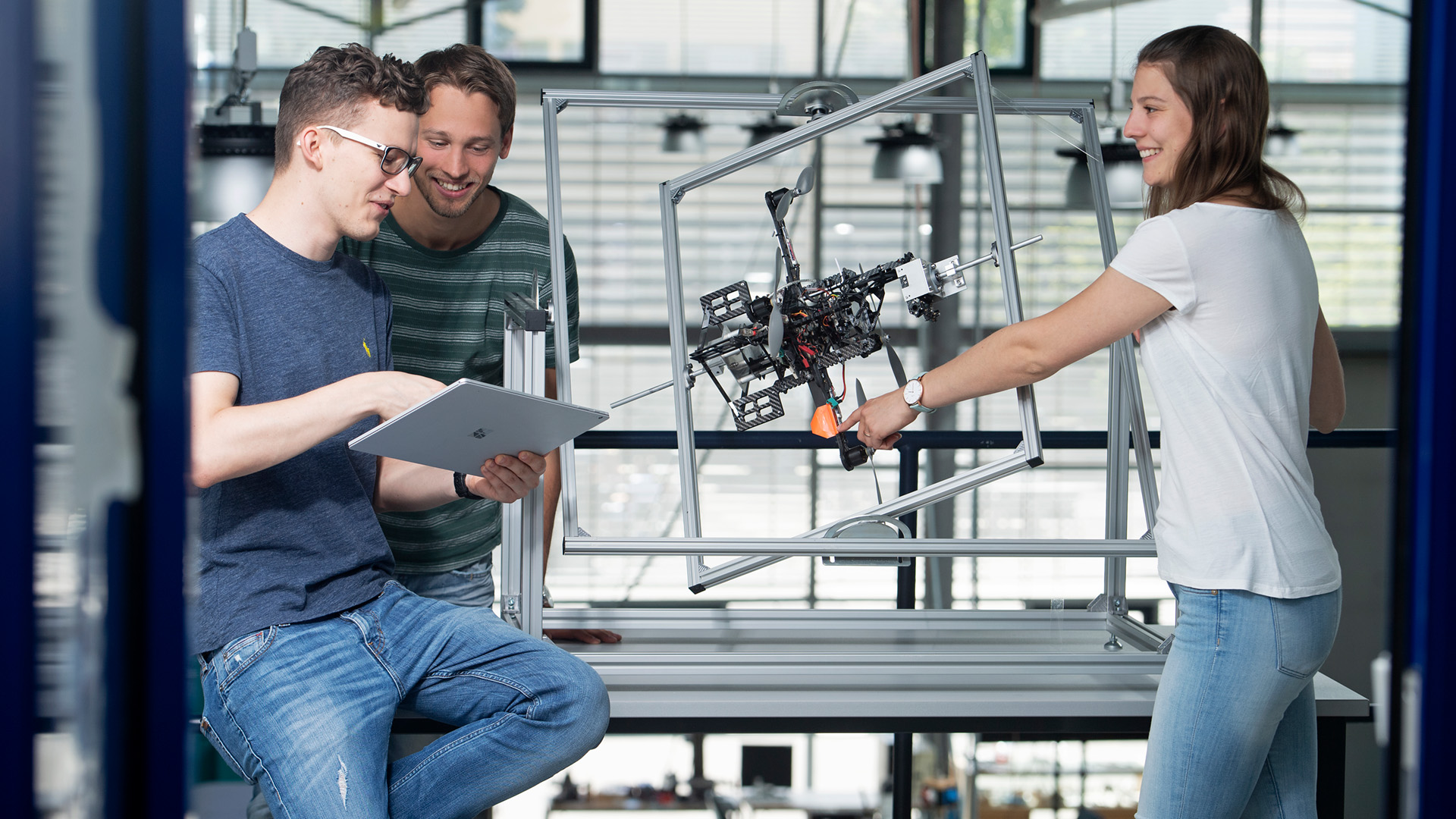Content Information
Some students have the possibility to work on interdisciplinary projects commissioned by the industry. Scientific work and the application of innovative
engineering methods are taught with team projects. Also social competence and soft skills are on the curriculum.
1. Semester
30 ECTS
Numerical Methods in CAD
Numerical Methods in CADModule Numerical Methods in CAD Courses a) CAE Methods and Algorithms 2 ECTS Contents
Examination Forms and Prerequisites for Awarding ECTS Points | 4 ECTS |
Design and Development 1
Design and Development 1Module Design and Development 1 Courses a) Design Methodology Case Study 2 ECTS Contents Examination Forms and Prerequisites for Awarding ECTS Points
| 6 ECTS |
Dynamics
DynamicsModule Dynamics DDM Courses a) Multi Body Systems 2 ECTS Contents Contents Examination Forms and Prerequisites for Awarding ECTS Points | 4 ECTS |
Integrity of Structures
Integrity of StructuresIntegrity of Structures Courses a) Integrity of Structures 4 ECTS b) Failure Analysis 2 ECTS Contents a) Integrity of Structures: Advanced concepts for the life‐time assessment under variable amplitude loading: Nominal stress concept for cyclic loading, structural stress concept for cyclic loading, local stress concept for cyclic loading, local strain concept for cyclic loading, fracture mechanics concept Application of numerical tools for the life time prediction Selected topics / ongoing research topics: e.g. very high cycle fatigue (VHCF); fatigue behaviour of composite materials; Influence of edge conditions on fatigue behaviour, multiaxial fatigue... Laboratory exercises: Non‐destructive testing, experimental determination of material and component flow curve, Neuber`s Law, Masing behaviour, local stress‐strain loops, test drives with strain gauges, collecting data for load time history, numerical life time assessment b) Failure Analysis: Historical failures, typical failures at car structures, reason for failures, concepts for component optimization, definition and classification of failures, methods of failure analysis, characteristics of failures under static and cyclic mechanical, thermal and chemical loading, practical case studies and exercises Examination Forms and Prerequisites for Awarding ECTS Points Written exam, 120 minutes, graded Lab reports and lab tests | 6 ECTS |
Vibration and Acoustics 1
Vibration and Acoustics 1Module Vibration and Acoustics 1 Courses: a) Vibration and Acoustics Measurement 2 ECTS b) Vibration and Acoustics Measurement 2 ECTS Contents Examination Forms and Prerequisites for Awarding ECTS Points | 4 ECTS |
Advanced Strength of Materials
Advanced Strength of MaterialsModule Advanced Strength of Materials Courses a) Lightweight Design 4 ECTS Contents Examination Forms and Prerequisites for Awarding ECTS Points | 6 ECTS |
2. Semester
30 ECTS
Advanced Materials Technology
Advanced Materials TechnologyModule Advanced Materials Technology Courses a) Advanced Engineering Materials 2 ECTS Contents a) Advanced Engineering Materials: Car Body Technology: Car Body Parts, Deep Drawing, Cutting, Hemming, Extruding, Integrated Approach Sheet Materials: Strengthening, Production of Sheet Materials, Properties High Strength Steel Sheets: Phases, Mild Steels, IF‐Steels, BH‐Steels, Micro Alloyed Steels, Multiphase Steels, Press Hardening Steels, Recent Developments Aluminium Sheets: Wrought Alloys, Strengthening Mechanism, Naturally Hard Alloys (5xxx), Precipitation Hardenable Alloys (6xxx), Superplasticity, Aluminium/Steel‐Mix Bodywork Tailored Components: Tailored Blanks, Partial Press Hardening, Multilayer Sheets, Fusion Sheets Plastic Behaviour: Characteristic Values, Anisotropy, Yield Locus, Plastic Behaviour, Forming Limits, Wrinkle Formation Method Planning: Material Flow, Process Chains, Derivation of Method from Component Geometry, Drawing Method b) Surface Technology: Basics in corrosion, thermal coating, CVD, PVD, electrochemical deposition, corrosion protection of stainless steel and light metals, leak, sealing, dip coating, design of the corrosion protection for all the components of passenger cars, testing methods c) Composites materials: Understanding the concept of fiber-reinforced composites. Prediction of elastic properties of laminae. Understanding the macromechanics of a lamina. Understanding the macromechanics of a laminate. Solution of design problems Examination Forms and Prerequisites for Awarding ECTS Points Written exam, 120 minutes, graded | 6 ECTS |
Project Work
Project WorkModule Project Work Courses: Project Work 8 ECTS Contents: Independent work on a given individual engineering task in a project team consisting of several students (usually 3 to 4 students) under the guidance and support of project supervisors. Writing of a scientific project report. Weekly discussion/coaching of the project progress with the project supervisor. Within the framework of the seminar: Presentation of project results. Examination Forms and Prerequisites for Awarding ECTS Points: | 8 ECTS |
Design and Development 2
Design and Development 2Module Design and Development 2 DDM Courses a) Advanced CAD 2 ECTS b) Design of Experiments 2 ECTS Contents b) Design of Experiments: General introduction into DOE, differences to experience‐based test planning, execution and results of a DOE; Attempts plan: selection parameters to be investigated and result sizes, establishing the testing area; Test plan designs: Overview DOE designs (factorial, response surface, mixture, optimal designs), selection of designs; Creating designs with a DOE software tool; Specific variables in the DOE: randomization, blocks replication, resolution / confounding; Evaluation of experimental design results: effects and effect size, interactions, statistical tests in the DOE, review the validity; Optimization calculation, prediction and confirmation tests: graphical representation of the effects of parameters, numerical optimization, predict outcomes, evaluation of test results; Application of the DOE to some practical examples as well to a final exercise with all the main points mentioned Examination Forms and Prerequisites for Awarding ECTS Points | 4 ECTS |
Design for Manufacturing
Design for ManufacturingModule Design for Manufacturing DDM Courses a) Production‐oriented Product Design 6 ECTS Contents Examination Forms and Prerequisites for Awarding ECTS Points | 8 ECTS |
Vibration and Acoustics 2
Vibration and Acoustics 2Vibration and Acoustics 2 Courses a) Vibrations 2 ECTS Contents Contents Examination Forms and Prerequisites for Awarding ECTS Points | 4 ECTS |
3. Semester
30 ECTS
Master Thesis and Soft Skills
Master Thesis and Soft SkillsMaster Thesis and Soft Skills DDM Courses a) Soft Skills 3 ECTS Contents Examination Forms and Prerequisites for Awarding ECTS Points | 30 ECTS |





